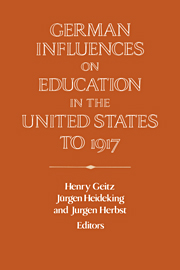Book contents
- Frontmatter
- Introduction
- PART ONE AMERICANS AND GERMANS LOOK AT EACH OTHER'S SCHOOLS
- 1 American Observations Concerning the Prussian Educational System in the Nineteenth Century
- 2 Interdependence between Democratic Pedagogy in Germany and the Development of Education in the United States in the Nineteenth Century
- 3 Prussian Volksschulen through American Eyes: Two Perspectives on Curriculum and Teaching from the 1890s
- 4 American Responses to German Continuation Schools during the Progressive Era
- PART TWO VARIETIES OF TEACHERS AND STYLES OF TEACHING
- PART THREE GERMAN SCHOOLS IN AMERICA
- PART FOUR THE GERMAN INFLUENCE ON HIGHER EDUCATION
- Index
2 - Interdependence between Democratic Pedagogy in Germany and the Development of Education in the United States in the Nineteenth Century
Published online by Cambridge University Press: 05 January 2013
- Frontmatter
- Introduction
- PART ONE AMERICANS AND GERMANS LOOK AT EACH OTHER'S SCHOOLS
- 1 American Observations Concerning the Prussian Educational System in the Nineteenth Century
- 2 Interdependence between Democratic Pedagogy in Germany and the Development of Education in the United States in the Nineteenth Century
- 3 Prussian Volksschulen through American Eyes: Two Perspectives on Curriculum and Teaching from the 1890s
- 4 American Responses to German Continuation Schools during the Progressive Era
- PART TWO VARIETIES OF TEACHERS AND STYLES OF TEACHING
- PART THREE GERMAN SCHOOLS IN AMERICA
- PART FOUR THE GERMAN INFLUENCE ON HIGHER EDUCATION
- Index
Summary
Around the middle of the nineteenth century, democratic theories of pedagogy exercised a powerful influence in Germany. German liberal educators who were forced to emigrate to America after 1848 viewed the educational system that they encountered there through the prism of their democraticliberal doctrines. Educational mediators such as Friedrich Adolph Wilhelm Diesterweg and Friedrich Frobel drew from the experiences of German teachers in America to find confirmation of their theories and to continue their criticism of the Prussian-German educational system throughout the remainder of the century. Although the return impact of German democratic theories of pedagogy upon American schools reveals itself only in fragmentary form, it is nonetheless clear that since the mid-nineteenth century, these German theories and the course of the development of education in the United States have existed in a state of interdependence.
This interdependence proved to be possible because a tremendous number of Germans emigrated to the United States after the failed democratic revolution of 1848. Diesterweg himself had been a passionate supporter of that revolution. Although calculations differ, nearly 1 million people left Germany between 1849 and 1854, not only to escape the repression that folio wed the revolutionary events, but also to free themselves from the restrictive power structures of the reaction. Among the emigrants were many who had been trained in Germany as teachers.
- Type
- Chapter
- Information
- Publisher: Cambridge University PressPrint publication year: 1995



